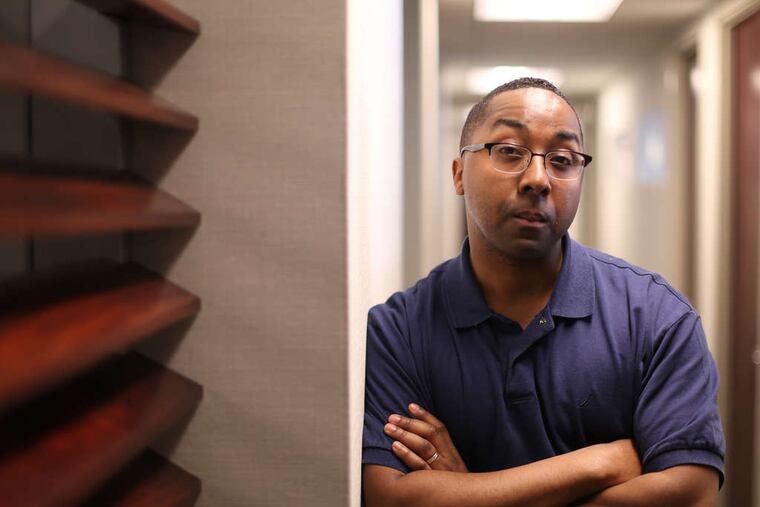With another delay, one Philly teen still stuck in school-to-prison pipleline
Lawyer fighting school-to-prison pipeline one kid at a time faces another hurdle.

SOMEWHERE BETWEEN Municipal Judge Frank Brady's first and third deep sigh inside courtroom 503 yesterday, I thought someone was finally going to put an end to a case one lawyer called "the dumbest criminal case of all times."
The 2014 school fight I wrote about last week was marked on the docket as "Must Be Tried." Not a lot of room for interpretation, I thought.
But then Assistant District Attorney Lauren Realberg asked for a continuance because a school officer, who she said was necessary to the case, injured her ankle and was not able to be in court. Judge Brady, in hopes of resolving a yearlong case, then asked the D.A.'s office to reconsider accepting 19-year-old Shawn Yarbrough into a diversionary program that could wipe his record clean. Realberg returned shaking her head: No dice.
Sigh.
Judge Brady granted the D.A.'s office a continuance until June 22. Apparently that whole "Must Be Tried" is a mere suggestion in Philly courts.
What's the big deal, right? It only leaves a Philly teen in limbo for another month. Those jobs Yarbrough has applied for since his graduation and his electrical training program will surely still be there whenever the courts decide his fate.
He's already had to put his job search on hold a dozen times to come to court. What's one more time? And if after all of the continuances, things don't go Yarbrough's way and he gets a couple of years in jail, or - knock on wood - probation for a couple of third-degree misdemeanor charges, what's another Philly teen with a record?
The school-to-prison pipeline doesn't feed itself, people.
Yarbrough's court-appointed attorney, Damian Sammons, knows a criminal record could ruin a teen's life before it even begins. That's why, even though the easiest thing for him to do would be to get the best deal for Yarbrough and move on, he keeps challenging the case.
"I'm not just representing him at this age," Sammons said when we first spoke. "I'm trying to represent the man I hope he will become."
One without a criminal record over a dumb move.
Sammons shook his head as he walked out of the courtroom. "This is unbelievable," he said.
Objection, counselor! What I witnessed in that fifth-floor courtroom yesterday somersaulted right over unbelievable and landed somewhere around crazy-town. In fact, it made me wonder if there was something personal behind all the time and taxpayer dollars spent over one school fight. How else to explain the D.A.'s seeming insistence on nailing a teenager over something that happens in schools all over the city.
As I wrote last week, Yarbrough was arrested last year with a bunch of other students at South Philadelphia High School when a fight broke out inside a second-floor hallway.
Of all the students arrested that afternoon, only he and another young man were ultimately charged with misdemeanors after a judge threw out the other cases for lack of evidence.
On paper, the two look similar. Both were charged with disorderly conduct and failure to disperse. Neither had ever been arrested as adults.
Yarbrough was arrested twice as a juvenile, once for an altercation with a girl whose phone he took and another time for vandalism. The first case was withdrawn by prosecutors. He was ordered to do community service and given probation for the vandalism.
But while Yarbrough's classmate was accepted into the district attorney's accelerated rehabilitation disposition program - ARD - Yarbrough was inexplicably and repeatedly rejected.
Brian Fishman, the court-appointed attorney for the other student in what he called "the dumbest criminal case of all times," said that based on what he knew it didn't add up. A juvenile record is taken into consideration, but several attorneys - including the former head of ARD program - told me clients with much worse juvenile records have received ARD.
Sammons was eventually told that his client was denied because he was the oldest - by five months - and the ringleader, and that the fight was possibly gang-related. Except nothing in the police report or the transcript of the preliminary hearing supports those claims. The best explanation I could get was a stock remark about how each case is reviewed on its merits.
Outside the courtroom yesterday, other lawyers asked a very deflated-looking Sammons how the case went. Was it discharged? Did his kid get ARD? They shook their heads in disbelief when he answered no.
And then Yarbrough, who is hoping to get a job at the airport, asked Sammons a question he couldn't answer: "So next time will be the last time, right?"
Phone: 215-854-5943
On Twitter: @NotesFromHel